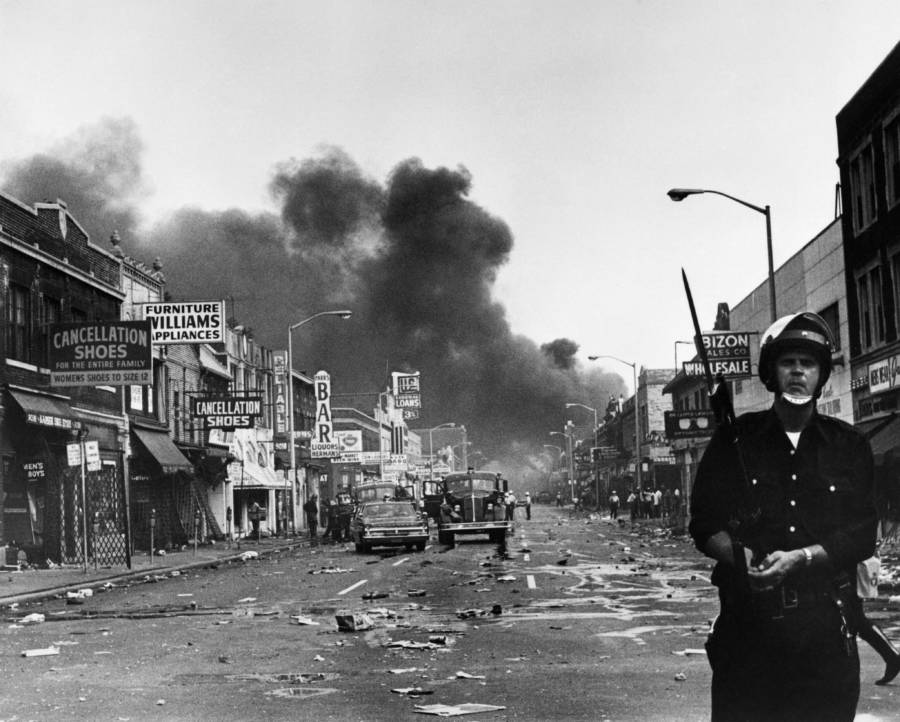
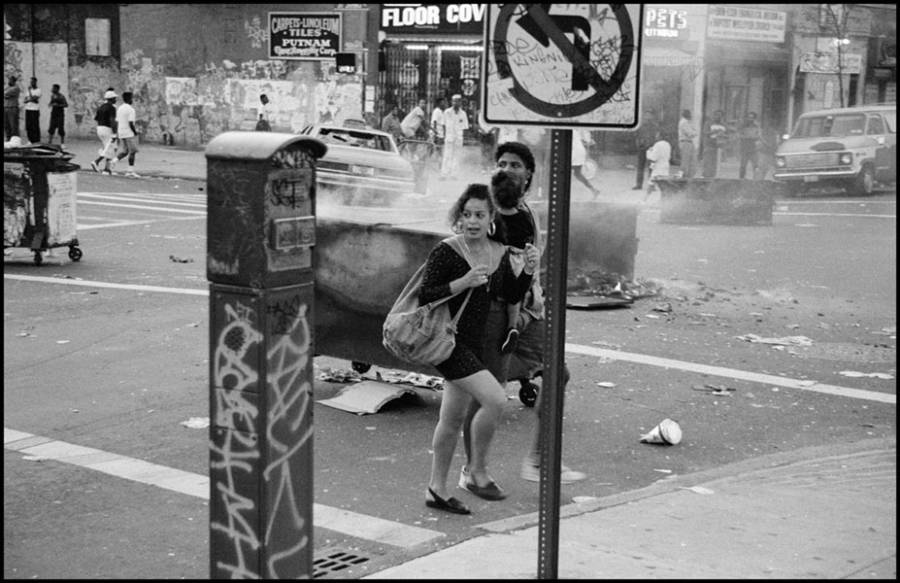

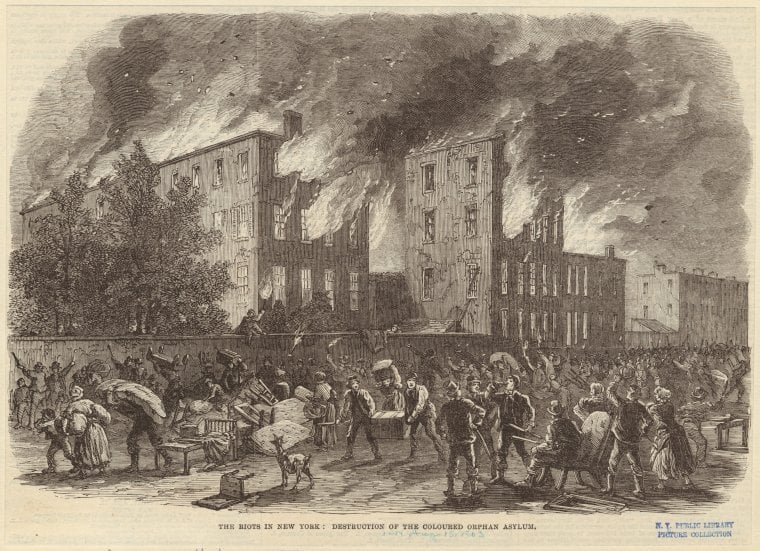
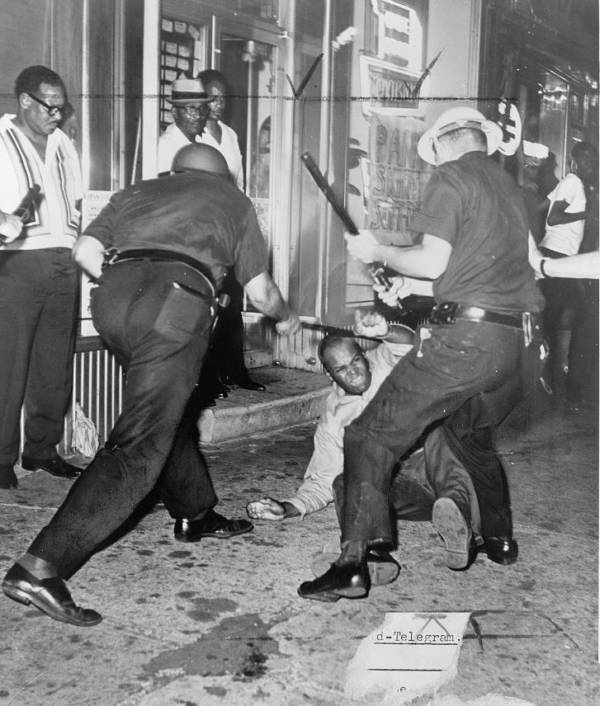



























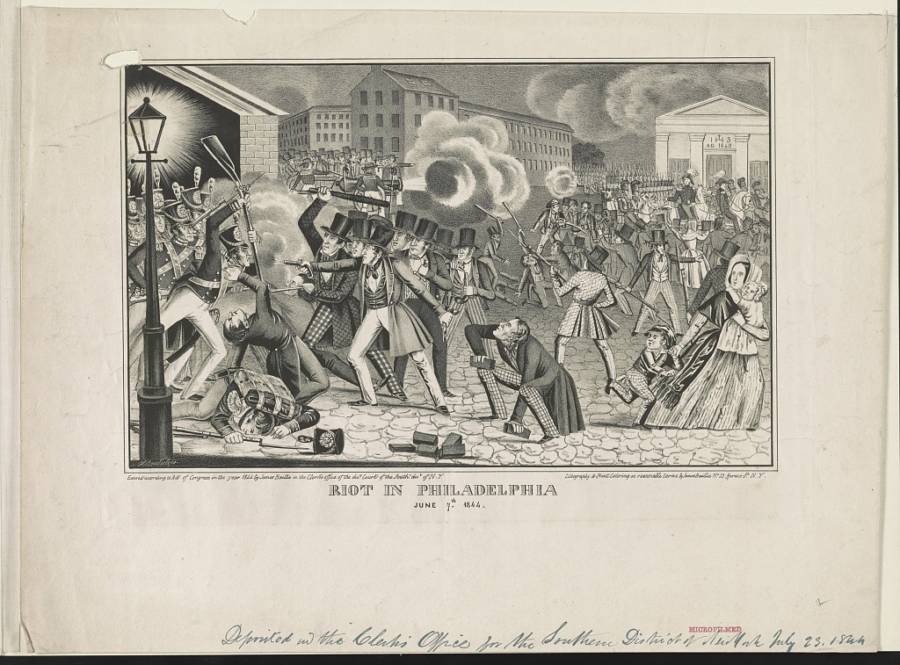



And if you liked this post, be sure to check out these popular posts:
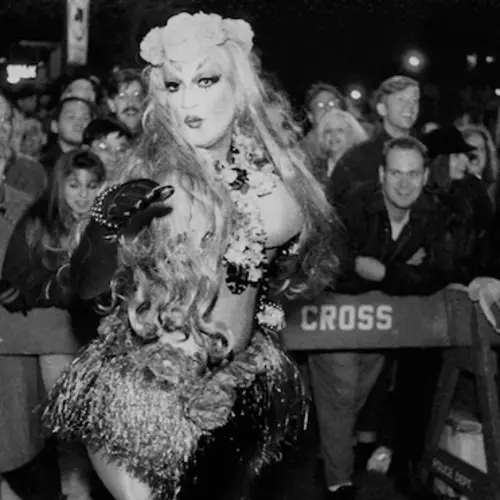
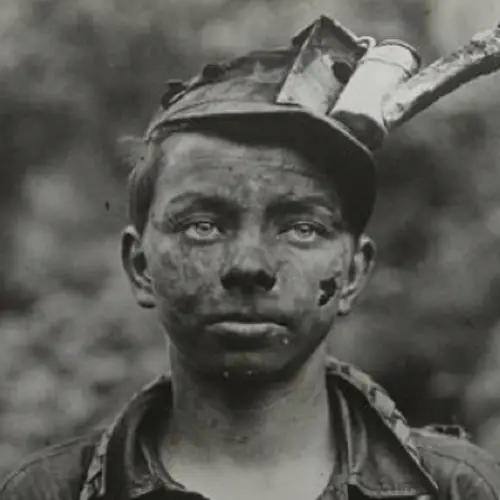
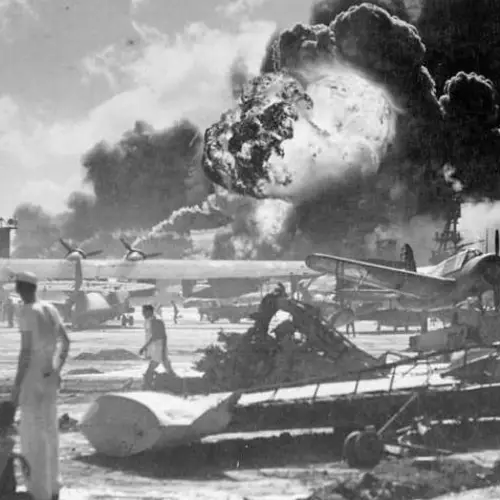
Detroit Riots Of 1967
Ultimately, after intervention from the local police, the National Guard, and the Army, the riot ended with damages including 43 dead, 1,189 injured, 7,200 arrested, and 2,000 buildings destroyed.-/AFP/Getty Images
Crown Heights Riot
The 2016 Charlotte Protests
The New York City Draft Riots
While completely accurate casualty estimates aren't available, historians agree that well over 100 people died and another 2,000 or more suffered injuries.New York Public Library
The Harlem Riot Of 1964
Accounts vary wildly as to whether or not the officer was in any way justified in the shooting, but what is certain is that approximately 4,000 New Yorkers, largely angry at mistreatment of African-Americans in the city, took to the streets and clashed with police until hundreds were injured and hundreds more arrested.Dick DeMarsico/New York World Telegraph & Sun/Library of Congress via Wikimedia Commons
The 1992 Los Angeles Riots
Even with the tape, on April 29, 1992 the jury returned guilty verdicts for none of the four officers. Outraged at this incident and years of police injustice like it, thousands took to the streets in riots that lasted six days, killed 55, injured more than 2,000, and put more than 11,000 in handcuffs.HAL GARB/AFP/Getty Images
The San Francisco State Strike
When police were called in, the clashes between them and students often turned violent. While this episode doesn't number among the country's most violent, it did help usher in the wave of ethnic studies programs that most universities take for granted today.Underwood Archives/Getty Images
The Haymarket Square Riot
The trouble began when workers gathered to both campaign for an eight-hour work day and protest recent killings of workers by the police. After one rioter threw a bomb at the police attempting to quell the disorder, the violence erupted immediately.Harper's Weekly via Wikimedia Commons
Newark Riots
Democratic National Convention Riots, 1968
On August 28, after police began beating a man who had attempted to take down an American flag, the most infamous and violent night of the entire episode began. Authorities battled with civilians right there in the street outside the hotel where the delegates were staying, all in front of live television cameras.Bettmann/Contributor via Getty Images
Memphis Riots Of 1866
Angry at the African-American Union soldiers patrolling their city, scores of Memphian whites, including many Irish immigrant policemen, roamed the city for three days, robbing, assaulting, and killing as many African-Americans as they could find. Ultimately, 46 lay dead, while 91 African-American homes, 12 African-American schools, and four African-American churches sat in ruins. Alfred Rudolph Waud/Harper's Weekly via Wikimedia Commons
The Ferguson Unrest
The 1968 Washington, D.C. Riots
The 1968 Pittsburgh Riots
The 1968 Chicago Riots
The 1968 Baltimore Riots
Astor Place Riot
Among the deadliest of all these incidents was the Astor Place Riot of May 10, 1849. A rivalry between a British actor, William Charles Macready, and an American one, Edwin Forrest, at the Astor Opera House tapped into deeper resentments between the largely Anglophile upper classes and the Americanized lower class immigrants. These resentments came to a head when 10,000 showed up to the theater for a Macready performance on May 10, tearing it apart and killing several dozen people in an all-out class war.New York Public Library
The Bonus Army
The government responded by calling in thousands of soldiers and policemen, along wth tanks, resulting in clashes that left more than 1,000 injured and the veterans still without their bonuses.U.S. Army/National Archives and Records Administration via Wikimedia Commons
Red Summer
That competition, fueled by underlying race and class hatred, turned deadly as scores of whites attacked African-Americans (and, rarely, vice versa), killing as many as nearly 300 nationwide throughout the summer and early fall.Library of Congress via Wikimedia Commons
The Orange Riots
Atlanta Race Riot Of 1906
Amid a context of growing white resentment toward African-Americans over their increasing share of the job market and political power, whites became outraged following newspaper reports of four white women being sexually assaulted allegedly by African-American men. Violence ensued until a militia was able to restore order -- but not before copious damage was done. Le Petit Journal/National Library of France via Wikimedia Commons
Columbia University, 1968
For eight days, two different protest groups -- one rebelling against Columbia's plans for a segregated gym and its encroachment into Harlem, the other against Columbia's recently revealed connections to a Department of Defense-affiliated weapons think tank -- battled with both student counter-protestors and the police. The police eventually moved in with tear gas to put an end to the unrest.Bettmann/Contributor via Getty Images
The Chinese Massacre
In full view of hundreds of witnesses, the mob then tortured and killed between 17 and 20 Chinese immigrants. Despite those witnesses -- and possibly with help from some local politicians -- none of the perpetrators ever saw the inside of a jail cell. Los Angeles Public Library via Wikimedia Commons
The Boston Massacre
The trouble began when several colonists, upset at unpopular legislation and taxation from the British Parliament, surrounded a British sentry stationed in the city to restore order. As the mob grew agitated, several soldiers fired into the crowd, killing five and wounding others. Leading Patriots like Paul Revere (partially responsible for the famous engraving pictured here) and Samuel Adams then used the incident to help stoke revolutionary fervor in the colonies, thus altering the course of American history forever.Library of Congress
The 2015 Baltimore Riots
Following Gray's death on April 19, the city came under a state of emergency as protestors clashed with police, looted stores, and set fires over the next two weeks. The aftereffects spread into the following month, which saw the second highest number of murders in the recorded history of Baltimore.Drew Angerer/Getty Images
The Memorial Day Massacre Of 1937
The Stonewall Riots
The Cincinnati Courthouse Riots Of 1884
A mob whose strength eventually reached 10,000 stormed the jail in search of the killer on March 28. Despite hundreds of police and militiamen and the blockade they'd built around the jail, rioters managed to destroy the courthouse (pictured, along with the blockade) as well as carry out a wave of arson and looting before the storm subsided on March 30.Wikimedia Commons
The Boston Tea Party
A protest of the Tea Act and of Britain's taxation without representation policies in the colonies as a whole, the demonstration began when a group of men destroyed a shipment of British tea by tossing it off its ship and into the harbor. The British soon responded with acts ending Massachusetts' self-government, thus hastening the coming of the revolution.Nathaniel Currier/Wikimedia Commons
The Detroit Race Riots
With jobs thus becoming scarce and the city becoming crowded, racial tensions soared as whites sought to keep African-Americans out of their neighborhoods. Finally, on June 20, 1943, fueled by false rumors of racially motivated attacks, mobs of the poor from both races began clashing with police and each other. The fighting lasted three days and left 34 dead, many of them African-Americans at the hands of police.Arthur S. Siegel/Library of Congress via Wikimedia Commons
New Orleans Riot Of 1866
The federal government's outrage at this violence helped persuade them to pass the Fourteenth Amendment (full citizenship for freedmen) and the Reconstruction Act (military oversight of the South) soon after.New York Public Library
Houston Riot Of 1917
Things turned violent on August 23, 1917, when two Houston police officers assaulted two African-American members of the regiment. Soon, the entire regiment marched into Houston, killing 16 people (including four policemen) before reconsidering and stopping their charge. Regiment leader Sergeant Vida Henry killed himself that night, while 19 faced execution for their actions and 41 received life sentences at trial (pictured).National Archives and Records Administration via Wikimedia Commons
Philadelphia Nativist Riots
The Tulsa Race Riot
On May 21, 1921, when a rumor circulated that a young black man had sexually assaulted a young white woman, a mob of white men took to the streets looking for vengeance, causing scores of black men to fight back.
Over the next two days, the city became a veritable war zone with gunfights and fires that destroyed more than 35 city blocks and killed anywhere from a few dozen to 300 (estimates vary wildly).Library of Congress via Wikimedia Commons
The Doctors' Riot
In April 1788, when several children witnessed medical student John Hicks of New York Hospital (pictured) doing that very thing, a mob that eventually grew to 2,000 strong stormed the hospital, forced many of the city's doctors into hiding, and did battle with the militiamen called in to restore order, ultimately leaving as many as 20 dead.Joel Tyler Headley/British Library via Wikimedia Commons
Watts Riots
Upset at racial discrimination and police brutality, the city's African-American population grew further upset after the violent, public arrest of two young African-American men and their mother following a scuffle with police on August 11. Between 31,000 and 35,000 people then took to the streets in riots that left 34 dead, 1,032 injured, 3,438 arrested, and $40 million worth of property damaged.New York World-Telegram/Library of Congress via Wikimedia Commons




"The limitation of riots, moral questions aside, is that they cannot win, and their participants know it," said Martin Luther King Jr. in an address to the Southern Christian Leadership Conference (SCLC) just weeks before his death on April 4, 1968.
"Hence riots are not revolutionary but reactionary because they invite defeat," King continued. "They offer an emotional catharsis, but they must be followed by a sense of futility."
Just after April 4, King's death set off perhaps the largest and most destructive wave of riots that the United States had ever seen.
And in the years leading up to his death, the civil rights and anti-war causes in which King played a leading role had informed some of U.S. history's most devastating riots (a loaded, often pejorative word that's used instead of, say, "demonstrations" or "protests" in accordance with how marginalized the principal racial and socioeconomic group involved is).
So it is that Martin Luther King Jr., of all people, ought to have known whereof he spoke when he addressed the SCLC in early 1968. But perhaps he wasn't quite right.
King's words do in fact illuminate the essential tension at the core of all riots, one between fury and impotence, zeal and futility. But while King's words ring true in the short term, their accuracy seems to fade as time wears on.
In other words, perhaps riots indeed "cannot win" in the sense that they cannot and do not right the proximate wrongs to which they are reflexively responding -- the Boston Tea Party didn't get the Tea Act repealed, the Rodney King riots didn't put his abusers behind bars, and so on.
However, in the longer view of history, riots certainly can and often do ameliorate the underlying societal ills to which they are responding -- the Boston Tea Party did help usher the colonies toward revolution, the Rodney King riots did lead to the creation of the Rebuild L.A. redevelopment initiative to fight urban decay.
And yes, Rebuild L.A.'s notorious failures outnumber its underpublicized successes, but those successes may never have come to fruition at all without the impetus of the riots.
That's not to condone mass violence and destruction, but instead to suggest that dismissing riots as mere societal tantrums (as Martin Luther King Jr. himself once did) is myopic. For better and worse, riots, maybe more than any other kind of mass civil action, have always both charted and changed the ever tumultuous course of American history.
Underneath the sound and fury, riots have always been one of the few ways for the ignored to make themselves known to the powerful. Or as King himself put it, in what actually may be one of American history's most insightful explanations on the matter, "A riot is the language of the unheard."
From before the American Revolution to the present, the calamitous yet consequential riots above bear out King's words.
Next, read up on the five strangest riots in history. Then, allow these 1968 photos to show you some more of America's worst riots all within that one tumultuous year.





